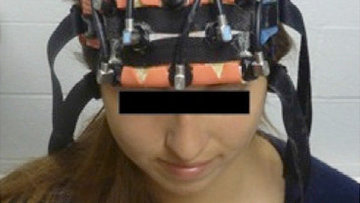MOSCOW, April 10 - RIA Novosti . Swiss and American neuroscientists have discovered a particular zone cortical stimulation which causes a person to behave more honest than he was accustomed to, according to the Journal of the PNAS .
"Interestingly, our research has shown that brain stimulation reduced the desire to cheat only among those volunteers whose consciousness existed moral conflict between their actions and principles. Those who have not experienced such moral agony, did not respond to stimulation and maximize your profits "- says Christian Raff (Christian Ruff) from the University of Zurich (Switzerland).
In the new work, scientists have suggested volunteers to play a game of chance, invented specifically to test the honesty. Its members threw normal dice ten times and talked experimenters what figures they fell. At the same time, the monitor displays a winning combination of three digits, a roll of any of which scientists have paid nine francs player.
Neither the researchers nor the other participants in the experiment could not see which combinations managed to knock out, leaving huge scope for fraud. Accordingly, dishonest players can report without fear that they are almost always a winning options, and scientists have pretended not to notice anything.
In fact, the fact that the scam was not difficult to establish - at fair game the number of correct answers is always nearing five in accordance with the Statistics Act. If this indicator is deflected in the direction of large numbers, it always means that a player is cheating.
Watching the activity of several of these "crooks" and honest players, the researchers found that the top and right side of the prefrontal cortex (DLPFC) is a special area that includes the moment when a person decides to act honestly. Opening it, Raff team decided to test what would happen if you stimulate it with electrical current or, conversely, to suppress its activity.
As shown by the experiment, the volunteers became more honest after stimulation of this area - on average, they began to talk about the successful 5-6 dice, rather than 7-8, as was the case before the "treatment". This, however, does not touch the most hardened "crooks", that have been linked to the fact that these players are not considered cheating something shameful.
What is interesting, the inverse stimulation did not increase the desire to cheat, that Raff team connects with the fact that the level of fraud and so was very high, and he actually had nowhere to grow. Furthermore, the suppression of brain activity by using the electric current does not work predictably and stably as stimulation that could reduce the effect of such exposure.
As scientists hope, the further development of this technology can help in the rehabilitation of offenders and reduce the level of corruption - the current UN estimates, the share of bribes and various forms of bribery accounts for about 5% of world GDP, or about a trillion US dollars.
On the other hand, as noted by Michel Marechal (Michel Marechal), colleague Ruff at the university, such conclusions may be encountered in bayonets psychologists, because the presence of "integrity zone" and a different level of activity in the volunteers heads suggests that the propensity to commit crime depends mainly on biological factors. This, in turn, casts doubt on all modern concepts of free will and that the extent to which a person is responsible for his actions.





No comments:
Post a Comment